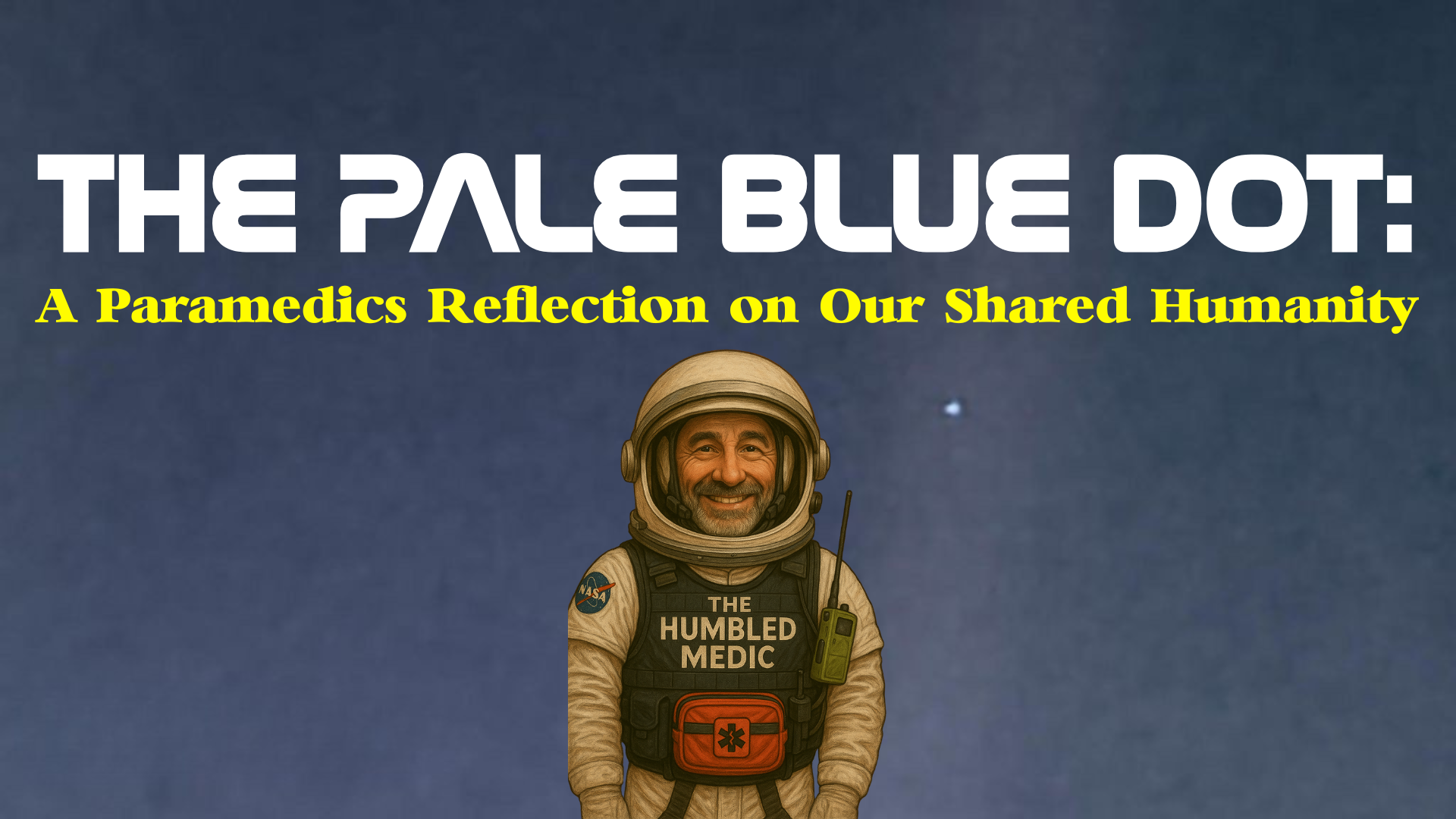Source: @Saganism101
Twenty + years on the ambulance, and I thought I’d seen it all. House fires that took everything from families. Car accidents that changed lives in an instant. Heart attacks that remind us how fragile we really are. But nothing—and I mean nothing—prepared me for the humility that hit me when I first heard Carl Sagan’s words about that pale blue dot.
You know the image I’m talking about. That tiny speck captured by Voyager as it looked back at Earth from the outer edges of our solar system. Just a single pixel, really. But as Sagan said, it was a pixel worth looking at.

Everything We Are, Right There
When I’m rushing to a call at 3 AM, sirens wailing, focused on getting to someone who needs help, it’s easy to get caught up in the urgency of the moment. The street address becomes the center of my universe. The patient becomes my entire world. But Sagan’s words remind me of something I sometimes forget in the heat of the moment: that address, that patient, that whole crisis—it’s all happening on what he called “a mote of dust suspended in a sunbeam.”
Think about it. Every call I’ve ever run, every life I’ve tried to save, every family I’ve comforted—it all happened on that same pale blue dot. The millionaire having a heart attack in his mansion and the homeless veteran I found behind the gas station? Same dot. The gang member with a gunshot wound and the little girl who fell off her bike? Same dot.
“The aggregate of all our joy and suffering,” Sagan said, and man, does that hit different when you’ve been in people’s living rooms during their worst moments and their most joyful ones.
The Folly of Our Divisions
I’ve seen people bleed the same red blood regardless of their race, religion, or political views. I’ve held the hands of Democrats and Republicans as they took their last breath, and let me tell you, fear sounds the same in every language. Yet we spend so much energy hating each other over what Sagan called the “scarcely distinguishable corners” of our tiny world.
He talked about “rivers of blood spilled by all those generals and emperors” fighting to be masters of “a corner of a pixel.” Every war, every conflict, every senseless act of violence—it’s all been over pieces of this same small stage in what he called “a vast cosmic arena.”
In my line of work, you see how quickly it can all end. How a split second can change everything. How fragile this whole human experience really is. And yet we waste so much time on hatred, on building walls between ourselves, on treating others as less than human because they live in a different corner of our dot.
A Humbling Perspective
Sagan said that astronomy is “a humbling and character-building experience,” and I couldn’t agree more. When you really grasp that our entire species—every saint and sinner, every hero and coward, every person you’ve ever loved and every person who’s ever frustrated you—has lived out their entire existence on this lonely speck floating in the cosmic dark, it changes how you see things.
There’s no hint that help will come from elsewhere, as Sagan put it. We’re on our own out here. All we have is each other and this pale blue dot that’s “the only home we’ve ever known.”
Our Responsibility to Each Other
Every time I respond to a domestic violence call, I think about how we’re fighting each other on this tiny world that’s already so vulnerable in the vastness of space. Every time I see someone refuse to help their neighbor, I remember that we’re all we’ve got out here in this “great enveloping cosmic dark.”
But I’ve also seen the other side. I’ve watched strangers pull people from burning cars. I’ve seen communities come together after disasters. I’ve witnessed the incredible capacity humans have for kindness, for sacrifice, for love. And maybe that’s the real message of the pale blue dot—not just that we should be humbled by our smallness, but that we should be inspired by our ability to care for each other despite it.
Preserving Our Only Home
Sagan talked about our responsibility to “preserve and cherish the pale blue dot.” As someone who’s spent over two decades trying to preserve and cherish individual human lives, I get it. This planet isn’t just our home—it’s our only home. Every forest, every ocean, every breath of clean air we have exists on this same fragile speck.
When I see the effects of pollution on the respiratory patients I transport, when I respond to heat-related emergencies that seem to get worse every summer, when I watch families lose everything to increasingly severe weather events, I’m reminded that taking care of our pale blue dot isn’t just environmental policy—it’s human survival.
A Final Thought
At the end of a long shift, when I’m finally heading home and I happen to look up at the night sky, I sometimes try to imagine what we’d look like from out there where Voyager took that picture. All of our drama, our politics, our daily struggles—just tiny movements on a pale blue dot suspended in a sunbeam.
It doesn’t make our individual lives less meaningful. If anything, it makes them more precious. Because in all that vastness, in all that cosmic dark, we found each other. We’re here, together, on this incredible little world that somehow supports life in an otherwise empty universe.
That’s worth being humble about. That’s worth protecting. And most importantly, that’s worth treating each other with the kindness and respect that fellow passengers on this pale blue dot deserve.
As Sagan reminded us, our “posturings” and “imagined self-importance” look pretty silly when viewed from the right perspective. But our capacity to care for each other? Our ability to create meaning and beauty and love on this tiny stage? That’s not diminished by our cosmic insignificance—it’s made all the more remarkable because of it.
The next time you’re stuck in traffic, or arguing with someone online, or feeling like your problems are the center of the universe, take a moment to remember: we’re all just fellow travelers on a pale blue dot, floating through the cosmos together. And that perspective, humbling as it is, might just change how you see the person in the car next to you.

